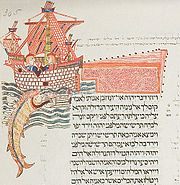Jonah (prophet)
Jonah (Hebrew, יוֹנָה, pr. Yōnā), meaning "dove", in Latin Ionas, or in Arabic يونس ("Yūnus"), was a prophet of Yahveh, in the Old Testament, and of the Jewish Tanaj; he is the fifth of the minor prophets of the Nevi'im, son of Amitai. In the Quran (Quran 37 (As-Saaffat), 139–148), Jonah is also one of the prophets of Islam.
Biography
According to the Bible, the Tanakh and the Koran, Jonah was a prophet. In compliance with the word of Yahveh, spread by the mouth of Jonah, King Jeroboam II managed to re-establish "the border of Israel, from the point of entry from Hamath to the very sea of the Arabah (the Dead Sea)". So it seems that Jonah was a prophet in the kingdom of ten tribes during the reign of Jeroboam II, who reigned 41 years (820 to the 779 BC) He is the same person whom Yahveh commissioned to proclaim judgment against Nineveh, for which reason he is considered the author of the homonymous biblical book.
Jonah's disobedience
Instead of fulfilling his assignment to preach to the Ninevites, Jonah decided to run away from her. In the port of Joppa he secured passage on a ship bound for Tarshish (usually associated with Spain or the Iberian peninsula), more than 3,500 km west of Nineveh.
After boarding, Jonah fell fast asleep in the "innermost parts" ship's. Meanwhile, the sailors faced a God-sent stormy wind that threatened to wreck the ship. They cried out to their gods for help and threw objects overboard to lighten the ship. The ship's captain woke Jonah, urging him to call upon his "God" as well. Finally the sailors cast lots to determine whose fault the storm had originated. Yahveh caused the lot to fall on Jonah. When questioned, he confessed that he had been unfaithful to his commission and, since he did not want others to perish through his fault, he asked to be thrown into the sea. After all efforts to return to land failed, the sailors did Jonah according to his word and the sea stopped its fury, then Yahweh arranged for a great fish to swallow Jonah, who spent three days and three nights inside. Jonah prayed to Yahveh glorifying him as savior and promising to pay what he had previously promised. Yahweh then ordered the fish to vomit the prophet onto dry land.
Jonah in Nineveh
When commissioned a second time to go to Nineveh, Jonah set out on the long journey to that city. "Finally Jonah began to enter the city a day's journey away, and kept proclaiming and saying, Just forty more days, and Nineveh will be overthrown."
The Bible does not say whether Jonah knew the Assyrian language or was miraculously empowered to speak it. Perhaps he spoke in Hebrew and someone who knew this language acted as an interpreter. In such a case, it is possible that Jonah's words aroused great curiosity and many people wondered what this foreigner was saying.
After having spent forty days without anything happening to Nineveh, Jonah was very upset because Yahveh had not destroyed the city, assuring that God is merciful and merciful, not only that, he prayed to God to take away the life and Yahveh answered him with the question: "Is it with reason that you have become inflamed with anger?". Later the prophet left the city and camped towards the east of the city, dome later became a bower. From that place, east of Nineveh, he watched to see what was happening to the city.
God prepared a gourd that would make it shade, this made the prophet happy, however, the next day God prepared a worm who would be in charge of ending the gourd, for which the prophet got angry and as a consequence had sunstroke, so strong that he wished for his death, again.
God teaches him that the prophet took pity on something he had not created, now how could God not have mercy on Nineveh?, a city where more than one hundred and twenty thousand people lived
The city was spared from God's judgment, because it turned from its wicked ways, but the Assyrian city was finally destroyed almost two centuries later in 612 BC by the Babylonians. It is said that the pharaoh of Psamético I the fifth pharaoh of the XXVI Dynasty of Egypt fought alongside the Assyrians to defend it but his fall was inevitable.
The Lesson
The story says that when a gourd miraculously grew to provide shade for him, the prophet was very pleased, but his joy was short-lived. The next day, very early in the morning, a worm caused the plant to dry up. Deprived of his shadow, Jonah was exposed to a scorching east wind and the hot sun beating down on his head. Again, he asked to die.
Through this gourd God taught Jonah a lesson in mercy. He felt sorry for the gourd when he had neither planted nor cared for it. So God said to Jonah, "Shouldn't I for one feel sorry for Nineveh, the great city, in which there are over a hundred and twenty thousand men who don't know the difference at all?" between his right and left hand, plus many domestic animals?".
The graves
Several sites have been said to be where Jonah was buried, but none of them have been confirmed as the real one.[citation needed]
The most recognized of his tombs was in the Iraqi city of Mosul, in the province of Nineveh, where the prophet lived and fulfilled his divine mandate, although no body rested in it. The site was a holy place for Jews, Christians and Muslims, but it was destroyed on July 24, 2014 by the Islamic State.
Contenido relacionado
National Coat of Arms of Mexico
Sculpture from italy
Diego de Alcala




